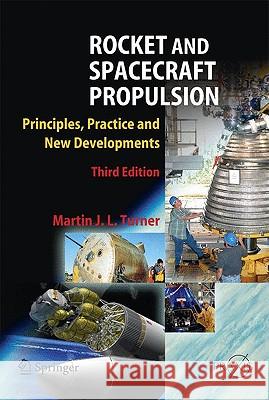Rocket and Spacecraft Propulsion: Principles, Practice and New Developments » książka
Rocket and Spacecraft Propulsion: Principles, Practice and New Developments
ISBN-13: 9783540692027 / Angielski / Twarda / 2008 / 414 str.
The 3rd edition of this practical, hands-on book discusses the range of launch vehicles in use today throughout the world, and includes the very latest details of some of the advanced propulsion systems currently being developed. The author covers the fundamentals of the subject, from the basic principles of rocket propulsion and vehicle dynamics through the theory and practice of liquid and solid propellant motors, to new and future developments. The didactic value of the early chapters on the basics of rocket propulsion, by re-working the derivations and updating the examples will be enhanced. The 3rd edition will stick to the same principle of providing a serious exposition of the principles and practice of rocket propulsion, but from the point of view of the user and enquirer who is not an engineering specialist. Most chapters will remain substantially the same as the second edition; they will be updated where necessary and errata corrected. In particular the new chapters added for the second edition, on Electric and Nuclear propulsion will remain substantially the same. In addition to general revision, updating and the correction of errata on all chapters, this updated edition will detail a number of new developments in the field Chapter 3 on Liquid propellant rocket engines will have new sections on air breathing engines and on new engines and propellants for the human exploration program. Chapter 8 will now de-emphasize the SSTO concepts, not longer seen as promising, and include new sections on variable thrust engines, again for human exploration. Other new developments following the announcement and subsequent development of NASA s new man-rated launcher, the ARES, and its Constellation vehicle set. Also covered will be sub-orbital space tourist vehicles and the new rocket engines, which have been developed for them. A new chapter on man-rated launchers and their important characteristics will detail this. New interest in Lunar exploration and the need to supply Lunar bases exposes the requirement for high efficiency engines for Lunar transportation and storage of high energy propellants like liquid oxygen and liquid hydrogen. New engines designed for in-space transportation and Lunar landing and departure will be added to the relevant chapters."











